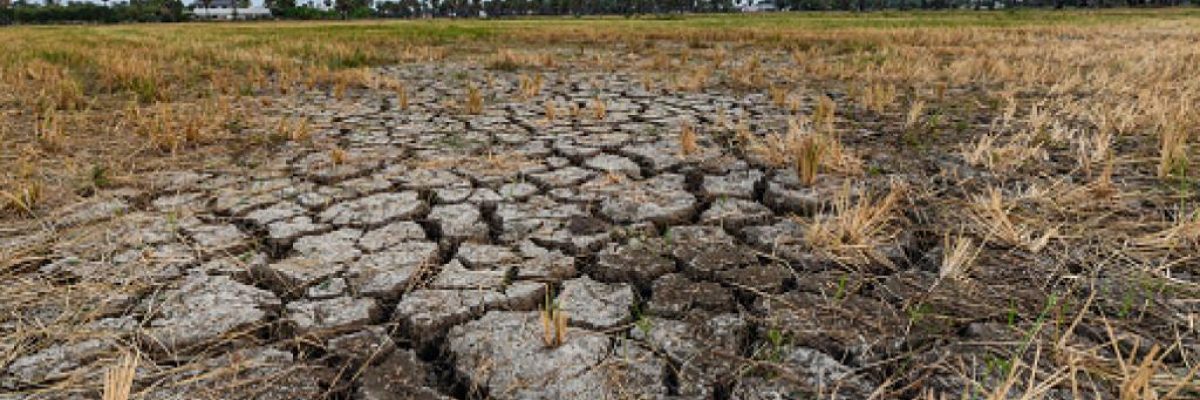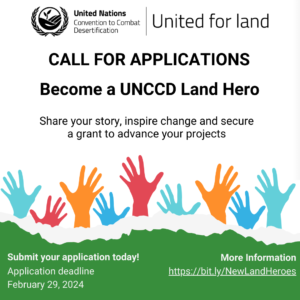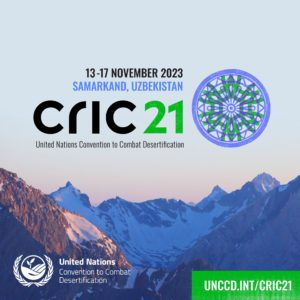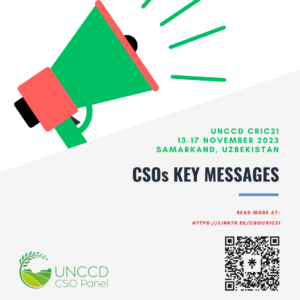CSO Synthesis of the Interim Report of the Intergovernmental Working Group on Effective Policy Implementation Measures for aAddressing Drought Under the UNCCD (ICCD/CRIC(19)/4).
Document ICCD/CRIC(19)/4) to be revised at the 19th session of the Committee for the Review of the Implementation of the Convention (CRIC).
____________________
This report summarises the progress made up to the 20th October 2020 by over 70 International organizations, stakeholders and country parties to UNCCD.
In brief the report addresses milestones of the following years:-
- 2013 High-level Meeting on National Drought Policy (Geneva)• Integrated Drought Management Programme (World Meteorological Organization and the Global Water Partnership)• Capacity Development Initiative on National Drought Management Policies
- 2015 2015–2030 Sendai Framework for Disaster Risk Reduction (Third United Nations Conference on Disaster Risk Reduction)• Paris Agreement (United Nations Framework Convention on Climate Change, twenty-first session of the Conference of the Parties)• Sustainable Development Goal 15.3 (strive to achieve a land degradation neutral world)
- 2016 Africa Drought Conference (Windhoek, Namibia)
- 2017 Conference of the Parties to the UNCCD at its thirteenth session (COP 13) establishes Drought Initiative and strategic objective on drought• Latin America and the Caribbean Drought Conference (Santa Cruz de la Sierra, Plurinational State of Bolivia)
- 2019 Establishment of the intergovernmental working group at COP 14.
The Intergovernmental Working Group (IWG) was established by decision 23/COP.14 with the terms of reference to take stock, review existing policy implementation, and institutional coordination and implementation measures including partnerships for addressing drought preparedness and response and to consider options for appropriate policy, advocacy, and implementation in the context of a wider holistic integrated approach.
The decision further specified that the IWG will consist of a maximum of 3 representatives nominated by the respective regional groups on the basis of nominations by national governments, plus up to 15 experts nominated by the secretariat in consultation with the COP Bureau. Once appointed, individuals nominated as regional representatives or as experts have equivalent rights and responsibilities as IWG members.
To address these issues appropriately, some group of task force have been established namely; Policy and Governance Task Group, Resources and Incentives Task Group, Vulnerability and Assessment Task Group, Monitoring and Early Warning Task Group with specific duties and responsibilities to address drought. Additionally, developed countries have made a number of submissions to the IWG concerning their support for international partnerships addressing drought. This material considers not only the total volume of financial assistance provided, but also its effectiveness and the substantive technical cooperation programmes that are supported.
Based on the initial review of submissions received by the IWG, it appears that significant capacity-building work is still needed to achieve the shift from monitoring triggers for responsive relief actions toward more advanced preventive actions that will promote sustainable development outcomes. Much of the in-country investment must come from stakeholders and affected countries. The international community could provide objective facilitation, technical support and additional resources, along with convening power and platforms to promote success.
The purpose of this document is to cause the IWG to prepare an interim report for consideration by the Parties at the nineteenth session of the Committee for the Review of the Implementation of the Convention (CRIC), which will be reported to the COP at its fifteenth session and will continue to work in the context of a wider holistic and integrated approach to disaster risk reduction and enhancing the resilience of communities and ecosystems.






